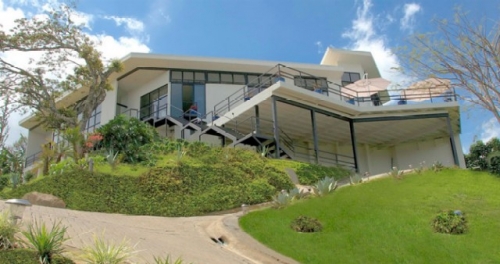Costa Rica Guide
Costa Rica Real Estate
List your property today!
Inclusion of real estate listings at Costa Rica Guide is
absolutely free of charge.
Featured Properties
Costa Rica Guide - Costa Rica Real Estate
Buying Process - Real Estate Information
Buying a Business in Costa Rica
By Thomas A. Burke, Attorney at Law
As a consultant on the legal and practical aspects of real estate and business investments, I find that the most frequent client requests center on the procedures involved in researching and then purchasing real estate. Next in demand are services that relate to forming a business corporation, generally from recently arriving investors who have the ambition of building a business in Costa Rica. I could go on to mention typical services in obtaining different government permits, in setting up employment contracts, rental contracts, and other business-centered contracts. Yet, the most challenging request from a prospective investor client is a situation in which all of the above must be taken into account in one very complicated transaction- the purchase of an operating business enterprise.
Since most worthwhile enterprises in Costa Rica are run through legally registered corporations, I will assume that our model business, in this case a medium-sized hotel and restaurant business, conforms to that norm. This brings us immediately to the first decision: whether to acquire the corporation by purchasing its capital stock from the owner(s) or to acquire the essential assets of the corporation and bring these into a newly formed corporation of your own.
This decision is of the utmost importance because if you buy the stock and take over the corporation and place of business, you will be taking over a corporation that, although it may have very visible assets, may also have hidden liabilities that are not on the corporate books. Although you would not be personally responsible for corporate liabilities, whether known prior to the purchase of the corporation or not, these could seriously affect the success of your investment.
Option 1: Purchasing assets
The only legally recognized and, in practice, secure solution is contained in Chapter 3 of the Costa Rican Code of Commerce, which makes provision for the "conveyance of a commercial establishment." The code declares any other means of purchasing an operating business null and void. This procedure allows for purchasing all essential assets of a business, that is, the group of components, worth more than the sum of its parts, including installations, inventories, intellectual property rights, trademarks, and clientele.
This path is rarely taken for two principal reasons, both practical. First, any essential permits, licenses, government tax incentives, and such must be reapplied for under the new corporate name, with no guarantee of success. This adds a great deal of work and expense to the prospective investment.
Second, the Commercial Code procedure can be very costly and can last for an indeterminable period of time. It entails publishing public notices for creditors to present claims (1-2 months of delay), and depositing the full price in cash, with a trustee charged with settling with creditors. If these creditors are not satisfied, they can potentially tie up the whole transaction in a civil court.
These hurdles are the price paid for buying a business guaranteed free of liabilities in Costa Rica. Yet the expense, time, and uncertainty fly in the face of real world practicalities, where conservative investors tend to keep their money in the bank, and those adventurous enough to buy out a medium-sized business don't want the problems involved in the process just described.
Option 2: Buying stock
So, you are left with purchasing the stock of the corporation holding the business you are interested in. Thus legally, as well as technically, this corporation will continue to own the business operation.
Before taking this step, you must carefully scrutinize the real situation as best you can. On the psychological side is the perceived honesty of the seller, which is either enhanced or prejudiced by how orderly and clear the business records are. On the business side, you will need to examine the records to judge the legal and financial health of the business. The following aspects are basic.
Public legal corporate records, such as recorded articles of incorporation, bylaws, type and amount of capital stock, and powers of attorney. These are best checked by a knowledgeable corporate law attorney.
Private legal corporate records, such as current stock ownership, possible pledges of same, and stockholder and board resolutions not on public record. These are also best checked by a knowledgeable corporate law attorney.
Corporate accounting. These records should clearly show the true income and expense situation, fixed and liquid assets, intangibles such as a business name, and short-and long-term liabilities. This accounting should also include the mandatory tax accounting books with updated information. These records are best checked by a certified public accountant.
Tax situation at the national level, including yearly income, sales, corporate stamp, property taxes, monthly sales taxes, and hotel lodging taxes. These are also best checked by a certified public accountant.
Tax situation at the local level, including municipal road taxes and commercial license fees. Local municipal charges for services such as waste removal, street lighting, and street cleaning should be checked simultaneously. These may be checked either by a certified public accountant or a knowledgeable attorney at law.
Permits, including the local health authority permit and the municipal business license. These should be checked for the specific activity currently being carried out; special licenses for the sale of domestic or foreign beers, wines, and liquors; permit for late hours functioning; and registration with the Tourism Board for lodging tax and recognition of a tourism quality restaurant. These permits are best checked by a knowledgeable attorney at law.
Employee records, including written contracts specifying employee particulars with responsibilities and salaries, along with up-to-date social security and worker's compensation insurance payments. Here, it is best to insist on payment of benefits (mandatory vacation, Christmas bonus, and severance pay) accrued by the employees to the date of closing. These records may be checked by a certified public accountant or a knowledgeable attorney at law.
Property title and plot map studies. Ascertain that the property is recorded in the name of the corporation, as well as checking for the presence of liens, encumbrances, mortgages, and judicial claims. The recorded measurements on the property title should agree with the actual measurements on site. This information is best checked by a knowledgeable real estate attorney in conjunction with a topographer where needed.
Lease contract (when the business locale is rented rather than owned). Check whether the lessor is the current owner the conditions for use of the property, and the rental payments ad possible increases. The buyer should take into account that tenancy law excludes the possibility of conveying the lease without the written consent of the owner, which probably implies renegotiations of the contract terms. In the case of a business located within a state-owned shoreline area, it is necessary to review the government lease contract and what constitutes compliance with its terms. This information is best checked by a knowledgeable real estate attorney.
Inventory. It must be clear that all furniture, equipment, and so on belongs to the Business Corporation, free of pledges and other encumbrances.
Utilities, including water, electricity, and telephone. Check to ensure that filling is up to date and is in the name of the corporation, or at least of the current property owner (in the case of a lease). Special attention must be paid to the telephone line(s), which in Costa Rica constitute a separate right subject to formal conveyance recording at the state Telephone Company.
Most of the foregoing are applicable to all operating business, yet, in my experience, most lack several. This leads to often tense negotiations between the buyer and seller, and unless the buyer is willing to accept some defects, or the seller is willing to remedy them, a deal is not likely to come about.
Beyond assessing the value and risk involved I the business under consideration, an attorney can attempt to provide some protection by including language in the purchase contract whereby the seller makes specific, written guarantees concerning the corporate liabilities, and whereby the buyer, when paying in installments, has the right to withhold payments if undeclared liabilities are discovered.
Some situations may call for a deposit of part of the purchase price with a trustee for a certain amount of time to guarantee performance of any remaining obligation on the part of the seller. The seller should always promise in writing to refrain from starting, purchasing, managing, or in any way participating in a similar business in the same area.
Option 3: Start your own business.
Another option for going into business in Costa Rica is to contemplate starting up the business from scratch. This entails dealing with all of the above at one time or another, mostly from the very outset, as well as taking into account matters not contemplated here, such as zoning, urban and construction regulations, and market studies.
Here, the risk is in whether, once these elements are dealt with, the business will actually succeed in the marketplace. This risk is precisely why many investors would rather take a certain risk on buying an already functioning business, knowing that the business has an established and positive financial situation.
As a last reflection, when faced with these rather dreary details, it is comforting to remember that there is more to life and business as well. Happy Hunting!
About the author: Thomas A. Burke is a member of the Costa Rican Bar Association, with years of experience in business administration and investment consulting in Costa Rica. He speaks fluent English, Spanish, German and French.
Please contact the author to obtain professional Costa Rica real estate legal advice.
Copyright 1996-2004
Note: The above information is not to be used for any other purpose other than private study, research, criticism or review. Thank you.






